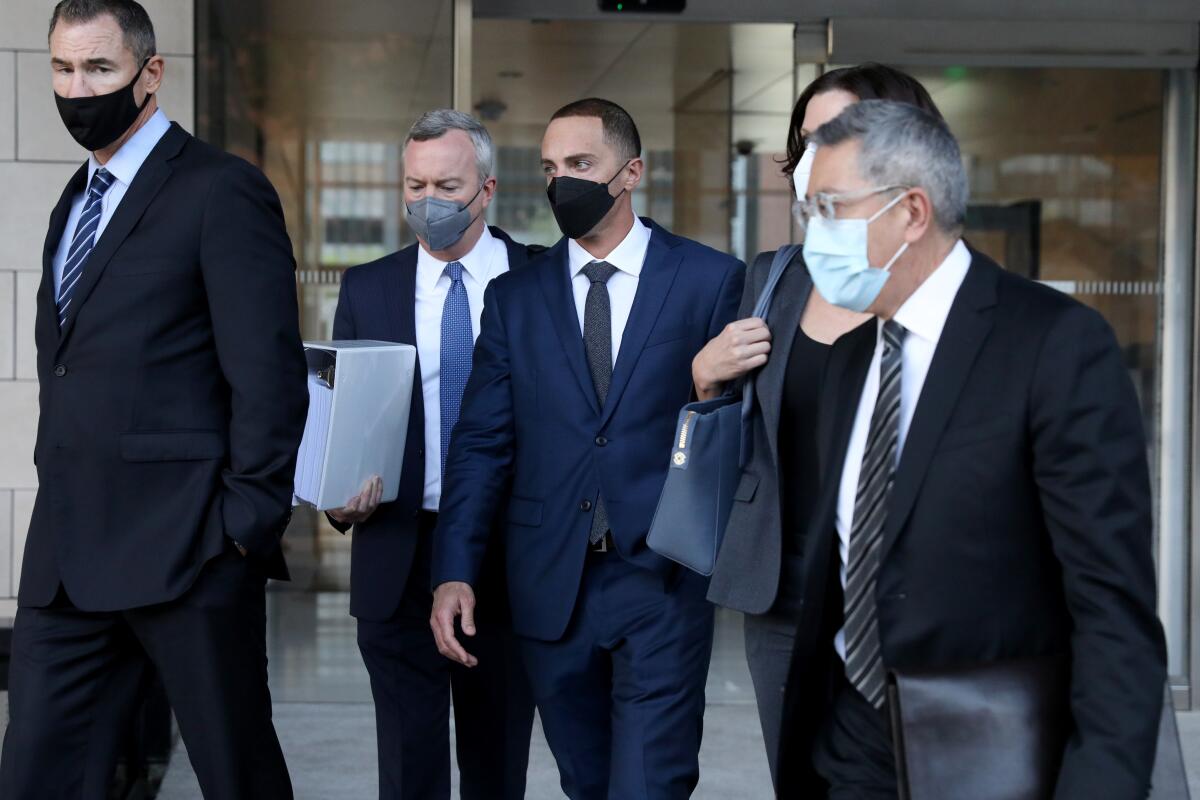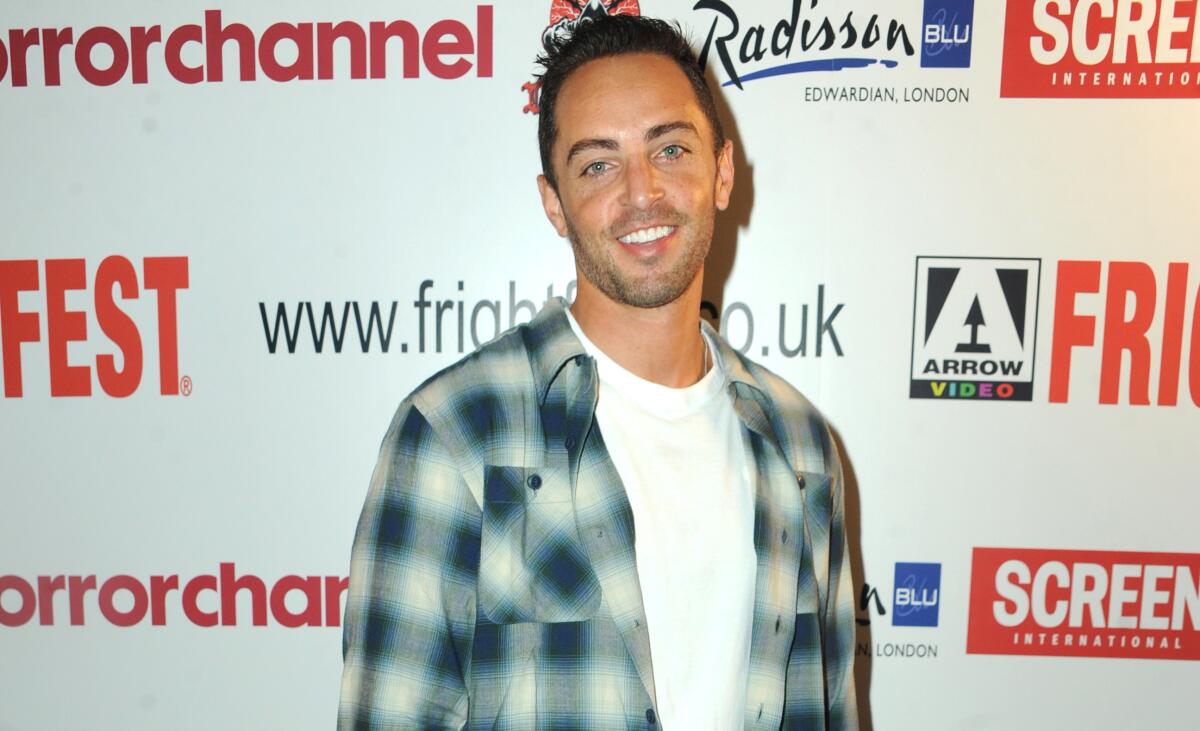Actor who faked movie deals sentenced to 20 years in prison for massive Ponzi scheme

- Share via
An actor who admitted fabricating HBO and Netflix film deals in a $650-million Ponzi scheme that prosecutors say is the biggest in Hollywood history was sentenced Monday to 20 years in prison.
Zachary Horwitz, 35, was also ordered by U.S. District Judge Mark C. Scarsi to pay $230 million in restitution to more than 250 victims, including some who were financially ruined in what prosecutors called a crime of “staggering magnitude.”
Horwitz told Scarsi he made “misguided, awful decisions” as he tried to break into the movie business and was sorry for the “immense pain and hardship” he caused. His attorneys told the judge that Horwitz was “not mentally well” and should not have to miss his two toddler sons growing up.
But Scarsi said it was striking that neither Horwitz nor his attorneys offered any explanation for the extravagant spending that was uncovered by federal investigators.
Scarsi ran down part of the list: $706,000 on interior decorating, $605,000 on Mercedes Benz and Audi cars, $345,000 on private jet and yacht trips, $174,000 on Los Angeles party consultant services, $136,000 on Las Vegas casinos and nightclubs and $6.9 million in credit-card payments to American Express.
“These are all expenditures of other people’s hard earned money,” Scarsi said.
Family members in the courtroom gallery sobbed as the judge announced he was following prosecutors’ recommendation and sentencing Horwitz to the maximum penalty allowed by law.

Horwitz, whose screen name in a handful of horror flicks was Zach Avery, pleaded guilty to securities fraud in October. He admitted that he forged HBO and Netflix film distribution contracts to trick investors into giving him at least $650 million.
Horwitz kept the scheme running for nearly seven years, using the money he took from new investors to repay old ones with returns from 25% to 45%. When the swindle collapsed, he owed them $230 million.
Prosecutors say he drew from that money to cover his luxury spending and buy a $5.7 million Beverlywood mansion with a screening room and wine cellar. What happened to the rest remains unclear.
Despite the restitution order, prosecutors acknowledged in a court filing that “the odds are close to zero” that Horwitz will ever repay more than a small fraction of that. They cast him as a calculating con artist whose professions of remorse were insincere.
“His Ponzi scheme was not an aberration from an otherwise law-abiding existence,” Asst. U.S. Attys. Alexander B. Schwab and David H. Chao told the judge in a memo. “The lie, which he sustained for years, was the core of his identity. He was a professional criminal; and, unfortunately for his victims, he was very good at his job.”
The damage wrought on victims “cannot be overstated,” the prosecutors wrote.
Horwitz’s attorneys suggested the government was, indeed, overstating the harm. They suggested he should owe just $60 million in restitution. They also urged Scarsi to consider unspecified psychological troubles dating to Horwitz’s childhood.
“Our client is not mentally well,” Horwitz attorney Anthony Pacheco told the judge.
Horwitz, dressed in a dark blue suit and tan shoes, sobbed as he asked Scarsi to let him be with his sons “while they are still young boys.” He promised to never again break the law.
“I hope you consider the whole man, not just the atrocious decisions that got me here,” he said.
Actor Zachary Horwitz collected $690 million from investors for movie deals the FBI says were fictitious.
Prosecutors called Horwitz’s fraud “eerily similar to Charles Ponzi’s eponymous scheme,” which fell apart in 1920 after the former fruit peddler and dishwasher could no longer sustain his scam of using the $250,000 he was collecting each day from new investors in his postal coupons to repay the earlier ones.
In their memo to Scarsi, prosecutors said Horwitz caused “immeasurable pain” to many of the more than 250 investors in his phony film deals.
While some were wealthy or institutional investors, others were middle-class or elderly people who lost their retirement savings, prosecutors said. They felt “shame, stress, depression, [temptations of] suicide, loss of dignity, and loss of faith in humanity,” their memo says.
Three victims spoke at the sentencing. One of them, Scott Cohen, 52, the father of two six-year-old boys, told Scarsi he filed for bankruptcy as a result of putting money into Horwitz’s bogus deals.
“The devastation has just been beyond words,” he said. Cohen called Horwitz “just another Bernie Madoff,” the New York financier imprisoned for running a $65-billion Ponzi scheme, the largest in history.
In a court statement, Cohen wrote: “I am surviving on food stamps, family loans, unemployment and any work I can find while I battle the combination of all my money being stolen and my other business being shut down from Covid. I have NOTHING!”
Another victim, an unnamed cancer survivor also running a small business, recalled taking out a loan to invest in the film deals. Horwitz “spent in one month what it took me 15 years of honest work to accumulate and borrow against,” the person said. “I started my business with an inheritance that took my father 60 years of hard work to accumulate. Gone in a flash on defendant’s cars, jets and watches.”

Victim statements cited by prosecutors included pleas for maximum punishment. One called Horwitz “a thief with no sense of morality or humanity.” Another said he was “sick to my stomach” envisioning the actor squandering his savings on “Lakers court-side tickets,” alluding to social media posts showing Horwitz enjoying the highest-price seats at basketball games.
The prosecutors’ memo said it would be “difficult to conceive a white-collar crime more egregious,” noting that Horwitz’s first victims were college buddies from Indiana University.
“He began by betraying the trust of his own friends, people who lowered their guard because they could not possibly imagine that someone they had known for years would unflinchingly swindle them and their families out of their life savings,” they wrote.
Starting in 2014, Horwitz told investors that his company, 1inMM Capital, was using their money to buy the foreign distribution rights to cheap movies, such as “Slasher Party” or “Satanic Panic,” and then reselling them at a profit to HBO, Netflix or other streaming platforms for distribution in Latin America and other markets around the world.
In each deal, Horwitz would issue a note to the investor promising repayment in six months or a year with a generous return. But when he pleaded guilty to securities fraud, Horwitz admitted that he never actually bought any film rights — and that he forged hundreds of distribution contracts.
Horwitz helped finance some of the films in which he appeared, but it’s unclear whether that money came from his investment scam, according to filmmakers who worked with him. None of the films were hits.
More to Read
Sign up for Essential California
The most important California stories and recommendations in your inbox every morning.
You may occasionally receive promotional content from the Los Angeles Times.











